On February 13, a specially designed real-time electronic counter flashing red numerals in the office of Ashish Rajpal, promoter-chief executive of iDiscoveri Education Services Pvt. Ltd, confirmed that the number of students enroled in the company’s flagship Xseed programme in 303 schools had crossed the 100,000 milestone. Dilip Thakore reports
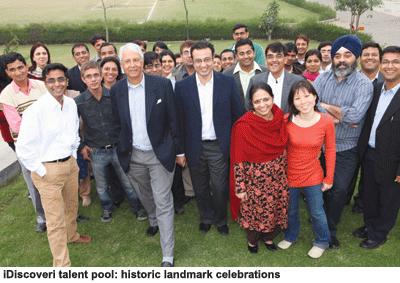
This year the annual day festivities of the Delhi/Gurgaon-based iDiscoveri Education Services Pvt. Ltd (estb. 2002) usually celebrated in end January with fun and games events for employees’ families, and topped off with a grand luncheon in the sprawling 10,000 sq. ft offices of the company abutting the campus of the Heritage School, Gurgaon, were postponed to coincide with Valentine’s Day on February 14.
Not without good reason. The previous day on February 13, a specially designed real-time electronic counter flashing red numerals stationed in the anteroom of the office of Ashish Rajpal, the Harvard-educated promoter-chairman of iDiscoveri, had confirmed a milestone. The number of students enroled in the company’s patented and flagship Xseed primary school learning programme adopted by 303 schools countrywide, had crossed 100,000. This year the company’s annual day celebrations had been postponed to await the crossing of this historic landmark. And by all accounts this year iDiscoveri’s 180 employees spread across the head office in Gurgaon and over a dozen locations countrywide, partied harder than ever before.
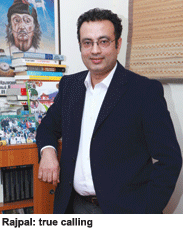 “Although our Xseed curriculum was introduced to K-VII schools as recently as 2007, and was accepted by only three schools in the first year, it is currently being taught in 303 primary schools in 22 states across the country. This curriculum which has been developed by our in-house CDR (Content, Design and Research) division after three years of intensive research, testing and refinement, has received excellent word-of-mouth publicity and is being increa-singly welcomed by educationists, teachers and primary schools. By the end of the current academic year ending June 30, we expect the number of client schools to be close to 500, and the number of children learning the Xseed way to reach 200,000,” says Rajpal.
“Although our Xseed curriculum was introduced to K-VII schools as recently as 2007, and was accepted by only three schools in the first year, it is currently being taught in 303 primary schools in 22 states across the country. This curriculum which has been developed by our in-house CDR (Content, Design and Research) division after three years of intensive research, testing and refinement, has received excellent word-of-mouth publicity and is being increa-singly welcomed by educationists, teachers and primary schools. By the end of the current academic year ending June 30, we expect the number of client schools to be close to 500, and the number of children learning the Xseed way to reach 200,000,” says Rajpal.
The growing acceptance of iDisco-veri’s innovatively-designed primary and middle school curriculum by leading private schools — government schools are not yet on the company’s radar — across the country is a personal vindication for Rajpal who in the millennium year forsook an enviable, high-flying transnational corporate career to venture into the stagnant waters of India’s education sector. An economics graduate of Delhi University with an MBA (marketing and finance) from the highly-reputed XLRI, Jamshed-pur, Rajpal began his corporate career with Procter & Gamble India in the early 1990s, and served in Moscow as marketing manager of the Brussels-based Sun Interbrew before bagging a spectacular appointment as the world-wide marketing director of Danone, the Paris-based dairy products and Evian water vending multinational (1998-2001).
Prior to the birth of his daughter in 1997, he became increasingly disillus-ioned with early childhood education practices and pedagogies worldwide. This prompted a change of heart and direction. Back home together with former batchmates and like-minded corporate professionals (Ronny Gulati, Lokesh Jindal, Tarun Chandana, and Gaurav Saiklani), he co-promoted the Delhi-based Youreka Outbound Pvt. Ltd (originally Discovery Outbound) — an outdoor experiential and hands-on education company. Convinced he had found his true calling in education, in 2001 Rajpal put in his papers at Danone, signed up for the Master’s programme of the Harvard School of Education where he studied under the tutelage of multiple intelligences guru Dr. Howard Gardner, and returned to India in 2002. “Giving up the business world to enter the education sector which offers the opportunity to shape the leaders of 21st century India, is a decision I have never regretted,” says Rajpal.
Since experiencing his dramatic conversion to the cause of “truly educating” the world’s largest child popu-lation over a decade ago (and investing almost his entire savings), Rajpal has gathered a galaxy of highly-qualified educat-ionists and proven business professionals — unprecedented in the history of primary-secondary education in India — under the iDiscoveri corporate banner. With a current headcount of 180, including 40 proven education professionals stewar-ding its Content, Design and Research division, iDiscoveri has made a promising beginning by drawing national attention to foundational primary education through innovative pedagogies designed to raise educa-tional standards and improve learning outcomes in India’s moribund primary school classrooms.
iDiscoveri’s path-breaking Xseed curriculum is simultaneously a teacher training and student stimulation teaching-learning programme designed to “help generate motivation and curiousity in teachers and learners; promote understanding of concepts; and build confidence”, and inspire teachers to graduate from “telling to teaching” and students from “hearing to learning” (according to the compa-ny’s promo literature). Unsurprisingly, it has been most enthusiastically welcomed in private primary schools in Tamil Nadu (pop. 62 million), tradi-tionally in the vanguard of education reform and development in the country. Currently 71 schools — almost one-fourth of all primaries countrywide which have signed up for the Xseed study programme — are sited in this southern littoral state.
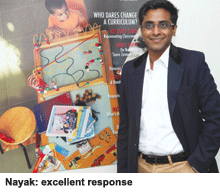 “There’s a great urge to improve teaching-learning standards in private schools in Tamil Nadu, particularly in small towns such as Sivagangai, Kovilpatti and Udulumpet. In this state which has traditionally prized English medium education, middle class households are ready, able and willing to pay tuition fees between Rs.400-700 per month to ensure that their children receive high-quality foundational education. With our promise of the Xseed programme helping every teacher improve her teaching, and every stud-ent her learning every day, iDiscoveri has received excellent response from progressive school managements in Tamil Nadu. In the year 2007-08, the Xseed programme was adopted by a mere three schools in the state. That number has risen to 71 currently and will increase to 150 schools by June 30, and to 500 by the end of the academic year 2011-12. Tamil Nadu hosts 4,500 English medium private schools and all of them are potential customers,” says Anustup Nayak, an alumnus of NIT, Rourkela, Georgia Tech (USA) and the Harvard School of Education, and partner and co-promoter who heads the company’s operations in this high-potential southern state.
“There’s a great urge to improve teaching-learning standards in private schools in Tamil Nadu, particularly in small towns such as Sivagangai, Kovilpatti and Udulumpet. In this state which has traditionally prized English medium education, middle class households are ready, able and willing to pay tuition fees between Rs.400-700 per month to ensure that their children receive high-quality foundational education. With our promise of the Xseed programme helping every teacher improve her teaching, and every stud-ent her learning every day, iDiscoveri has received excellent response from progressive school managements in Tamil Nadu. In the year 2007-08, the Xseed programme was adopted by a mere three schools in the state. That number has risen to 71 currently and will increase to 150 schools by June 30, and to 500 by the end of the academic year 2011-12. Tamil Nadu hosts 4,500 English medium private schools and all of them are potential customers,” says Anustup Nayak, an alumnus of NIT, Rourkela, Georgia Tech (USA) and the Harvard School of Education, and partner and co-promoter who heads the company’s operations in this high-potential southern state.
Yet although this new genre company has made — and continues to make — invaluable contributions to the development of innovative curriculums and teaching-learning systems to improve the quality and consistency of the primary education sector, it is pertinent to note that iDiscoveri and its affiliates are for-profit business enterprises, albeit driven by the highest principles of enlightened self interest. In a sector of the economy where profit is a dirty word and “commercialisation of education” is routinely denou-nced by learned judges of the Supreme Court, (although in recent landmark judgements — T.M.A Pai Foundation vs. Union of India (2002) and P.A. Inamdar vs. State of Maharashtra (2005) — they have reluctantly acknowledged the necessity of education institutions making “reasonable surpluses” for institutional growth and development), the iDiscoveri management’s unapolo-getic business-driven model which is being widely accepted, is welcome evidence of a societal mindset change towards private initiatives in Indian education.
Certainly within the company’s 180 employees there is unhesitating acceptance of iDiscoveri’s for-profit business model, even though there is reluctance to discuss sales and profit numbers (EW estimated revenue: Rs.50 crore in the year ending March 31). “There’s widespread awareness that gathering such a pool of talent under the corporate umbrella, and engaging in continuous research and development costs a lot of money. Therefore there’s unanimity within the company — and our growing clients’ community as well — about the legitimacy of our for-profit business model,” says a non-executive board member who preferred to remain anonymous.
By Indian standards the Xseed programme isn’t cheap. The one-time price of signing up for the Xseed curriculum customisation and teacher development progra-mme varies between Rs.3-7 lakh per school depending upon the number of subjects chosen. Currently the company offers this study programme for classes K-VII in four subjects — English, maths, science and social sciences. Subsequently an ‘alliance membership’ fee of Rs.99,000 per year is payable by every Xseed affiliated school.
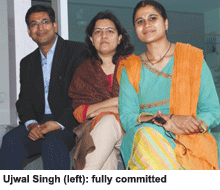 “The community of non-government educationists and educators, as also the country’s fast expanding middle class completely accept that quality education which requires continuous curriculum development and teacher training, comes with a price. And middle class parents are happy to pay it, because they are aware that the current school education system is not readying their children for the complex challenges of the new 21st century world. The overwhelming majority of parents countrywide want well-designed, engaging English medium curriculums for their children. In iDiscoveri we are fully committed to delivering this education service to primary schools, and that’s why we are growing at 100 percent per year,” says Ujjwal Singh, an alum of Patna University and IIM-Bangalore, who worked with several blue-chip corporates including TCS, NIIT and Hughes Communications before signing up with iDiscoveri in 2008 as vice president sales.
“The community of non-government educationists and educators, as also the country’s fast expanding middle class completely accept that quality education which requires continuous curriculum development and teacher training, comes with a price. And middle class parents are happy to pay it, because they are aware that the current school education system is not readying their children for the complex challenges of the new 21st century world. The overwhelming majority of parents countrywide want well-designed, engaging English medium curriculums for their children. In iDiscoveri we are fully committed to delivering this education service to primary schools, and that’s why we are growing at 100 percent per year,” says Ujjwal Singh, an alum of Patna University and IIM-Bangalore, who worked with several blue-chip corporates including TCS, NIIT and Hughes Communications before signing up with iDiscoveri in 2008 as vice president sales.
Nevertheless the phenomenon of new genre education companies offering well-designed — particularly ICT-driven — curriculums and teaching-learning systems is hardly novel. Several listed corporates including Everonn Education, Educomp Solutions and NIIT, and numerous unlisted compa-nies have been aggressively marketing new tech-driven pedagogies for longer periods. Yet the distinguishing feature of iDiscoveri is that it has invested heavily in human capital. Indeed the primary and secondary schools sector has never before experienced the infusion of proven professional talent — all the top managers of iDiscoveri are alumni of renowned higher education institutions such as XLRI, IIMs and Harvard University with management experience honed in leading corporates in India and abroad — on the scale that Rajpal has aggregated under the iDiscoveri banner.
This unprecedented investment in high-quality human resources has facilitated the design and development of the Xseed study programme which could change the way teachers teach and children learn in classrooms across the country. “Education research conducted world-wide has conclusively proved that learning through experience and experimentation is the most effective way. This is the premise on which we are developing and designing curricula in CDR. Therefore the Xseed primary school curriculum represents a sharp break from the received handed-down knowledge model. It is based on an entirely different pedagogy which encourages experiential learning, observation, analysis and experimentation.
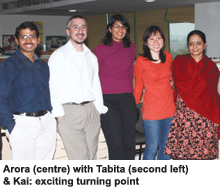 “Our comprehensive teacher manuals enable all — not necessarily gifted — teachers to plan and conduct lessons, while our specially designed notebooks engage children and make assessment easier. The overall objective is to make the teaching-learning experience joyous, and enable children to truly understand what they learn. The development of the Xseed curriculum is an exciting turning point in primary education in India. Our feedback indicates that it has generated genuine intellectual stimulation within teacher and student communities,” says Shweta Anand Arora, a graduate of the Lady Shri Ram College, Delhi and IIM-Ahmedabad who worked with the Boston Consulting Group (2002-04) and subsequently acquired a Masters in education from Harvard University. Currently Arora heads iDiscoveri’s 40-strong Content, Design and Research (CDR) division.
“Our comprehensive teacher manuals enable all — not necessarily gifted — teachers to plan and conduct lessons, while our specially designed notebooks engage children and make assessment easier. The overall objective is to make the teaching-learning experience joyous, and enable children to truly understand what they learn. The development of the Xseed curriculum is an exciting turning point in primary education in India. Our feedback indicates that it has generated genuine intellectual stimulation within teacher and student communities,” says Shweta Anand Arora, a graduate of the Lady Shri Ram College, Delhi and IIM-Ahmedabad who worked with the Boston Consulting Group (2002-04) and subsequently acquired a Masters in education from Harvard University. Currently Arora heads iDiscoveri’s 40-strong Content, Design and Research (CDR) division.
Other curriculum developers in iDiscoveri’s CDR division share Arora’s optimism. “A paradigm shift in writing textbooks is happening within iDisco-veri,” says Shimin Kai, an alumna of the National University of Singapore and Harvard School of Education. Adds Jared Tabita who has a string of deg-rees in education from the University of Pittsburgh and Arizona State University: “The curriculums being developed here are stimulating metacognition processes — teaching students to think. In the Indian context it’s a revolution,” he says.
More pertinently, the intellectual excitement generated by the revoluti-onary Xseed K-VII curriculum is not restricted to iDiscoveri employees alone. Seasoned educationists who have paid hard cash to introduce this enabling programme into their classrooms express satisfaction bordering on euphoria. “The biggest strength of Xseed is that it is not linear or rigid. As new theories, pedagogies and instructional methods are developed, they are incorporated into the school curriculum. I think it could revolutionise the education of our children,” says Ravi Kumar Sunkara, director of the Sri Gowthami Smart School, Hyderabad.
“To my teachers Xseed means liberation from the stranglehold of dead habit. To be able to do things differently and get from students that rare ‘aha’ moment repeatedly… To parents it means hope that their children will learn to think, decide, reflect and judge independently,” enthuses Nishi Misra, principal of the Mayoor School, Bhopal, promoted by the Mayo College Trust in 2007.
 With the Xseed programme well on stream and sailing smoothly, a diversification into promoting pre-schools across the country is the next big thing on the iDiscoveri develop-ment agenda, with eight Xseed pre-schools (of which four are wholly-owned) already operational in four states. “The distinguishing feature of Xseed pre-schools which currently provide early childhood care to 500 children between the ages of 18 months and five years in Gurgaon, Delhi, Chennai and Hyderabad, is that our curriculum familiarises children with nature and the environment in their early formative years. The green way is a creative and enjoyable way of learning and the feedback we have received is excellent. We are now poised for a national rollout under the wholly-owned Xseed pre-schools model,” says Faustina Sharma, a psychology grad-uate of Bangalore’s Mount Carmel College who acquired valuable project management experience in several companies including Kirloskar Systems, Compaq, TUV Rheinland and I-Flex Solutions before signing up with iDiscoveri in 2005, where she is a partner and head of pre-school delivery operations.
With the Xseed programme well on stream and sailing smoothly, a diversification into promoting pre-schools across the country is the next big thing on the iDiscoveri develop-ment agenda, with eight Xseed pre-schools (of which four are wholly-owned) already operational in four states. “The distinguishing feature of Xseed pre-schools which currently provide early childhood care to 500 children between the ages of 18 months and five years in Gurgaon, Delhi, Chennai and Hyderabad, is that our curriculum familiarises children with nature and the environment in their early formative years. The green way is a creative and enjoyable way of learning and the feedback we have received is excellent. We are now poised for a national rollout under the wholly-owned Xseed pre-schools model,” says Faustina Sharma, a psychology grad-uate of Bangalore’s Mount Carmel College who acquired valuable project management experience in several companies including Kirloskar Systems, Compaq, TUV Rheinland and I-Flex Solutions before signing up with iDiscoveri in 2005, where she is a partner and head of pre-school delivery operations.
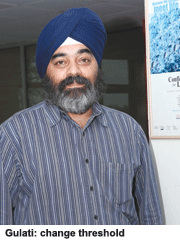 Simultaneously, over the past seven years iDiscoveri has consulted with several “promoters and philanthropists who share our education philosophy” to construct K-12 private schools under the BOOT (build, own, operate and transfer) model. “There’s no doubt in my mind that K-XII education in India is at a tipping point. Parents and households across the country are demanding better quality education for their children. There’s a new culture of receptivity to fresh ideas and pedag-ogies in private schools, which is also spreading to government schools. These favourable developments are prompting a growing number of entrepreneurs and philanthropists to enter the education sector as the regulatory regime becomes liberalised. I am very optimistic that Indian education is on the threshold of a revolutionary change,” says Ronny Gulati an alumnus of NIT-Trichy and XLRI who quit Godrej & Boyce in 1993 to turn education entrepreneur, and who together with Ashish Rajpal is a founder-director of iDiscoveri Education. According to Gulati, the company has already established seven primary-secondary schools in six states (Punjab, UP, Chattisgarh, Karnataka, Kerala and Andhra Pradesh) for several education entrepreneurs under the BOOT consulting model. “These assignments are highly selective, and their main purpose is to help create models of high-quality K-12 education,” explains Gulati.
Simultaneously, over the past seven years iDiscoveri has consulted with several “promoters and philanthropists who share our education philosophy” to construct K-12 private schools under the BOOT (build, own, operate and transfer) model. “There’s no doubt in my mind that K-XII education in India is at a tipping point. Parents and households across the country are demanding better quality education for their children. There’s a new culture of receptivity to fresh ideas and pedag-ogies in private schools, which is also spreading to government schools. These favourable developments are prompting a growing number of entrepreneurs and philanthropists to enter the education sector as the regulatory regime becomes liberalised. I am very optimistic that Indian education is on the threshold of a revolutionary change,” says Ronny Gulati an alumnus of NIT-Trichy and XLRI who quit Godrej & Boyce in 1993 to turn education entrepreneur, and who together with Ashish Rajpal is a founder-director of iDiscoveri Education. According to Gulati, the company has already established seven primary-secondary schools in six states (Punjab, UP, Chattisgarh, Karnataka, Kerala and Andhra Pradesh) for several education entrepreneurs under the BOOT consulting model. “These assignments are highly selective, and their main purpose is to help create models of high-quality K-12 education,” explains Gulati.
Meanwhile even as iDiscoveri’s Xseed programme and its related initiatives in pre-schools and K-XII schools, are making waves in the county’s estimated 100,000 plus private primary schools, which could well spark an overdue teaching-learning renaiss-ance in India’s moribund classrooms, over the past decade the company has quietly built a promising corporate consulting service. Its corporate leader-ship training practice conducts team-building programmes for companies. “I think there is a certain energy that iDiscoveri is able to unleash in companies. The approach is quite unconventional, which stimulates people to become energetic and participative. This helps to effectively communicate the whole concept of change management and mindset shifts,” says Vinita Bali, chief executive of the Bangalore-based Britannia Industries. Bali and 60 of Britannia’s top managers have worked with iDiscoveri over the past three years, to rebuild the organisation’s culture.
Moreover the company’s very first initiative in the education sector — Youreka Outbound Services Pvt. Ltd (first promoted as Discovery Outbound Services in 1996) — is also going strong. Youreka Outbound Services (YOS) manages three scenic outdoor education campuses in Yercaud (Tamil Nadu), Sitlakhet (Uttarakhand) and Sairopa (Himachal Pradesh) within estates with an aggregate area of over 200 acres, and capacity to host 100 students in tented accommo-dation. Thus far 50,000 children and adults have attended summer camps, leadership, teamwork, teacher training and other development programmes of YOS, paying fees ranging from Rs.5,000-10,000 per capita per week.
.gif) With its revolutionary Xseed teaching-learning programme being enthusias-tically welcomed in progressive schools across the country, the mood in iDiscoveri and its affiliates is distinctly upbeat. Comments Ranu Kawatra, chief advocacy advisor of iDiscoveri, who has brought invaluable organisation mana-gement experience from Cadbury India and Gillette India (1991-2006) in which he supervised the business development operations of the multinational in the subcontinent, Middle East and Africa prior to signing up with iDiscoveri in 2006: “Undoubtedly there’s a new temper in Indian education and an emerging consensus on what needs to be taught in the country’s schools. Our major contribution to the vital primary education system is how it needs to be taught within 45-minute classroom sessions. Yet the major challenge confronting Indian education is introducing contemporary curriculums in government schools. We have made a beginning in the kingdom of Bhutan, where at the invitation of the government we are implementing the Xseed programme in 14 government schools. In the process we are acquiring valuable experience and are confident that given official encouragement, we can adapt the Xseed programme for India’s 1.25 million government primary schools. That’s the country’s foremost need and our greatest challenge.”
With its revolutionary Xseed teaching-learning programme being enthusias-tically welcomed in progressive schools across the country, the mood in iDiscoveri and its affiliates is distinctly upbeat. Comments Ranu Kawatra, chief advocacy advisor of iDiscoveri, who has brought invaluable organisation mana-gement experience from Cadbury India and Gillette India (1991-2006) in which he supervised the business development operations of the multinational in the subcontinent, Middle East and Africa prior to signing up with iDiscoveri in 2006: “Undoubtedly there’s a new temper in Indian education and an emerging consensus on what needs to be taught in the country’s schools. Our major contribution to the vital primary education system is how it needs to be taught within 45-minute classroom sessions. Yet the major challenge confronting Indian education is introducing contemporary curriculums in government schools. We have made a beginning in the kingdom of Bhutan, where at the invitation of the government we are implementing the Xseed programme in 14 government schools. In the process we are acquiring valuable experience and are confident that given official encouragement, we can adapt the Xseed programme for India’s 1.25 million government primary schools. That’s the country’s foremost need and our greatest challenge.”
A pressing national need and challenge which has to be met in the interest of the world’s largest — and most short-changed — child population.